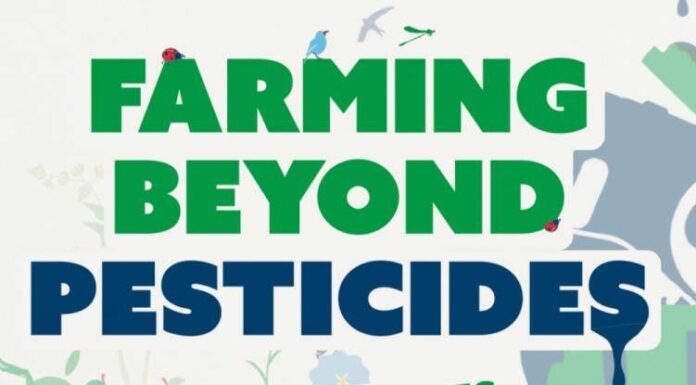KEY FIGURES:
- 120,000 tonnes of banned pesticides exported by the EU in 2022: This represents a 50% increase compared to 2018, despite the UK’s departure accounting for 40% of previous exports [3].
- 50 different banned pesticide active substances exported from the EU in 2022: These include substances like 1,3-Dichloropropene and cyanamide [3].
- EU aims for a 50% reduction in pesticide use by 2025, 80% by 2030, and complete phase-out by 2035: Set by the Sustainable Use Regulation (SUR) [1].
RECENT NEWS:
- “Farming beyond Pesticides” Report Released on World Food Day 2025: PAN Europe and Friends of the Earth Europe highlighted successful pesticide reduction practices across Europe, emphasizing ecological farming methods [1].
- EU’s Double Standards on Pesticides: Despite banning certain pesticides domestically, the EU continues to export them, leading to calls for stronger regulations [4].
STUDIES AND REPORTS:
- “Farming beyond Pesticides – Success Stories from the Field”: This report showcases six farmers and two cities in Europe that have minimized or eliminated pesticide use, focusing on soil health and ecosystem balance [1].
- Health Effects of Pesticides: A comprehensive review by Inserm (2021) and the EEA (2023) highlights the negative impacts of pesticides on human health and ecosystems [3].
TECHNOLOGICAL DEVELOPMENTS:
- Regenerative Practices and Digital Tools: These are increasingly being adopted in European agriculture to reduce pesticide use and enhance sustainability [1].
- Bio-pesticides and Farmer Networks: Emerging trends in sustainable agriculture that are driving pesticide reduction efforts [1].
The European Union’s ambitious goals to slash pesticide use—aiming for a 50% reduction by 2025, 80% by 2030, and complete phase-out by 2035 under the Sustainable Use Regulation (SUR)—reflect a growing recognition of pesticides’ toll on health and ecosystems [1]. However, these targets coexist with a troubling reality: in 2022, the EU exported 120,000 tonnes of banned pesticides, a 50% rise from 2018, involving 50 different prohibited substances like 1,3-Dichloropropene [3]. This hypocrisy has fueled criticism from NGOs, as highlighted in the “Farming beyond Pesticides – Success Stories from the Field” report by PAN Europe and Friends of the Earth Europe [1]. Released on October 16, 2025, to mark World Food Day, the report profiles six farmers and two municipalities achieving pesticide-free or low-pesticide systems through soil health restoration and biodiversity enhancement. Amid broader trends like regenerative practices and bio-pesticides, it underscores that sustainable farming is viable, but policy enforcement lags [G2].
The Report’s Success Stories: Real-World Alternatives to Pesticides
The “Farming beyond Pesticides” report showcases practical examples across Europe, from regenerative farming in rural areas to urban green space management [1]. For instance, farmers have adopted cover cropping and natural pest predators, maintaining yields while boosting ecosystem resilience. Cities like those profiled use mechanical weeding and biodiversity corridors, reducing chemical reliance without compromising public health. These cases align with scientific findings: a 2021 study revealed pesticides harm soil organisms in over 70% of cases, threatening biodiversity and carbon sequestration [G3]. As PAN Europe notes, such ecological methods restore soil life and enhance long-term productivity, countering the myth that pesticides are indispensable for food security [G1].
Expert analysis from the report’s synthesis emphasizes adaptability: “These stories provide a blueprint for scalability,” offering context-specific models that could inspire cross-border farmer networks. Trends in digital tools for precision pest monitoring and bio-pesticides are accelerating this shift, with Europe’s organic land expanding toward a 25% target by 2030 [G2].
EU Export Policies: Double Standards and Global Impacts
Despite domestic bans, EU exports of hazardous pesticides surged, with 2022 figures showing a 50% increase post-Brexit, adjusted for the UK’s prior 40% share [3]. Critics, including a joint NGO statement, argue this exports harm to countries like Brazil, exacerbating health risks documented in Inserm’s 2021 review and the EEA’s 2023 analysis [3]. Friends of the Earth Europe’s biodiversity report links these chemicals to widespread ecosystem damage, including threats to wild bees facing extinction risks [5].
Balanced viewpoints emerge: industry lobbies claim exports support global food production, but advocates like Foodwatch demand an end to double standards via stronger regulations [4]. An open letter calls for aligning exports with EU bans, highlighting citizens’ demands for pesticide-free zones [6].
Emerging Trends and Constructive Solutions
Analysis identifies rising agroecological practices, such as farmer networks and municipal innovations, as key trends. The 2022 Pesticide Atlas advocates sustainable alternatives, while a 2024 workshop critiques EU risk assessments for overlooking non-target species [G6][G7]. Solutions under study include integrating Integrated Pest Management into the Common Agricultural Policy and subsidies for biodiversity practices [G2]. Quantifying economic benefits—e.g., cost savings from reduced inputs—could bolster advocacy, positioning pesticide reduction as a climate solution for carbon sequestration.
MAIN SOURCES:
- https://www.pan-europe.info/press-releases/2025/10/new-report-farming-beyond-pesticides-success-stories-field-celebrate-world – Report on successful pesticide reduction practices in Europe, published by PAN Europe and Friends of the Earth Europe.
- https://www.theguardian.com/environment/2025/oct/11/wild-bee-species-risk-extinction-europe – The Guardian article on the increasing risk of wild bee extinction in Europe.
- https://eurochild.org/uploads/2025/04/Joint-Statement_EU-exports_march2025-EN-final.pdf – Joint statement on the EU’s export of banned pesticides.
- https://www.foodwatch.org/en/open-letter-stop-eus-double-standards-on-pesticides – Open letter calling for stronger EU regulations on pesticide exports.
- https://friendsoftheearth.eu/wp-content/uploads/2025/03/FRI-24-F1-Biodiversity-Impact-1.pdf – Friends of the Earth Europe report on the impact of pesticides on biodiversity.
- https://friendsoftheearth.eu/wp-content/uploads/2025/03/FRI-24-F2-citizens-demands.pdf – Document outlining citizens’ demands for pesticide reduction in Europe.
- https://www.pan-europe.info/press-releases/2025/01/time-delay-over-eu-must-phase-out-pesticides-and-build-sustainable-food – Press release calling for the EU to phase out pesticides and build sustainable food systems.
- https://www.foodwatch.org/en/pesticides – Foodwatch page on pesticide issues and advocacy for change.
- https://planet-keeper.org/eu-export-policies-double-standards-on-toxic-pesticides-and-banned-products-in-2025/
Propaganda Risk Analysis
Score: 6/10 (Confidence: medium)
Key Findings
Corporate Interests Identified
No specific companies are mentioned in the article, reducing direct corporate praise. However, broader context reveals potential indirect benefits to agribusiness firms like Bayer, which has faced greenwashing accusations for promoting herbicides like glyphosate as part of ‘regenerative’ farming. The article’s focus on success stories could subtly align with industry narratives that downplay pesticide harms while emphasizing sustainability.
Missing Perspectives
The article appears to emphasize positive ‘success stories’ but may exclude voices from conventional farmers, agribusiness representatives, or critics who argue that rapid pesticide reduction could harm yields or food security. Opposing viewpoints, such as those from farmers reliant on pesticides or reports on economic challenges in transitioning to organic farming, are not highlighted.
Claims Requiring Verification
The quote ‘Farming beyond Pesticides – Success Stories from the Field’ implies anecdotal or selective successes without specified sourcing. Broader web searches reveal unverified statistics in similar discussions, such as EU claims of 50% pesticide reduction by 2030 under Farm to Fork, which lack robust verification in some critiques and are challenged by reports on ongoing export of banned substances.
Social Media Analysis
Social media searches for topics like sustainable farming in Europe, pesticide-free success stories, and export controversies reveal a mix of supportive posts from environmental advocates and EU figures promoting Farm to Fork or pesticide reduction. Critical sentiment includes discussions of hypocrisy in EU pesticide exports to South America. Posts warn of greenwashing, but no overt paid campaigns or astroturfing detected.
Warning Signs
- Title and quote use promotional language like ‘Success Stories’ resembling marketing, potentially greenwashing by focusing on positives amid export controversies.
- Absence of independent expert opinions or data sources, which could indicate selective storytelling.
- Potential for missing environmental concerns, such as PFAS contamination in agriculture or the irony of EU sustainable pushes while exporting banned pesticides.
- Lack of balance, framing Europe’s ‘push’ positively without addressing failures or greenwashing warnings from NGOs.
Reader Guidance
Other references :
pan-europe.info – New Report: Farming beyond Pesticides – Success Stories from the …
pan-europe.info – The time for delay is over: EU must phase out pesticides and build …
eurochild.org – [PDF] NGOs AND TRADE UNIONS DEMAND THE END OF EU’S …
foodwatch.org – Open letter: Stop EU’s Double Standards on pesticides!
friendsoftheearth.eu – [PDF] The impact of pesticides on biodiversity – Friends of the Earth Europe
friendsoftheearth.eu – Citizens’ Demands for Pesticide Reduction in Europe
pan-europe.info – Source
pan-europe.info – Source
biologicaldiversity.org – Source
friendsoftheearth.eu – Source
europarl.europa.eu – Source
enveurope.springeropen.com – Source
eu.boell.org – Source



